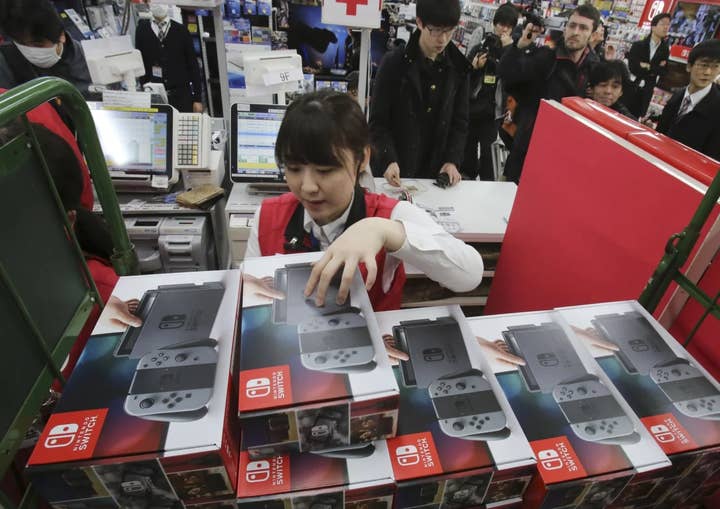Japan's return to growth is good news for everyone
After a decade of decline, Japan's console market growth challenges the long-standing idea that the smartphone sector was responsible for its woes in the first place
For those keeping score at home, the Nintendo Switch has just chalked up another fairly dramatic accomplishment; according to figures published by Famitsu this week, the success of Switch in Japan has pushed the country's game software and hardware markets into growth for the first time in 11 years.
There was a 30% jump in console game revenue in Japan last year - the lion's share of it being attributable to a spike in hardware revenues, though software sales also nudged upwards a little. The last time this market grew was back in 2006, coincidentally the year that saw the launch of the Wii at its tail end. Every year since then has seen the continuation of a slow decline in console revenues - until now.
"The success of Switch is undeniable, but the upturn in the market overall is a testament to broader strength; Sony is doing fine, the 3DS is chugging along, and Switch has built on top of that"
The success of the Switch, which Famitsu reckons had sold over 3.4 million units in Japan by December 31st, is the most obvious reason for this upturn, but it's not the whole story. The PlayStation 4, though a slow burn by comparison with Nintendo's newcomer, is also doing reasonably well, with a big enough installed base (approaching six million now) to deliver solid software sales. Meanwhile, Nintendo's 3DS remains the workhorse of the Japanese industry, with a pretty dramatic installed base figure of almost 24 million accounting for a pretty large proportion of software revenues.
The success of Switch is undeniable, but the upturn in the market overall is a testament to broader strength; Sony is doing fine, the 3DS is chugging along, and Switch has built on top of that firm foundation rather than cannibalising attention for existing systems.
This change in the fortunes of Japan's games market isn't just a feel-good story about Nintendo (and Sony) doing well in their home territory. It's important to look at the context and understand why console revenues have declined here for over a decade, because the picture will be hauntingly familiar to people in markets all around the globe.
Japan may have specific tastes and preferences in games to some degree (much to the chagrin of Capcom and Square Enix, it's unlikely that Monster Hunter and Dragon Quest will ever dominate charts in other territories as they did in Japan last year), but the background factors underpinning change in game consumption are broadly universal - making their reversal during 2017 into a story with relevance for everyone in the industry.

The most important thing to understand about the long decline in Japan's console game revenues is that they do not represent a nation "falling out of love" with games; Japan remains arguably the most developed (and profitable) market for video games on the planet. Rather, the slow decline in console revenues came alongside an incredibly rapid and dramatic boost in revenues from smartphone games.
"The most important thing to understand about the long decline in Japan's console game revenues is they do not represent a nation 'falling out of love' with games"
Japan is easily the world's most "mature" market for smartphone games, with consumers in the late 2000s rapidly adopting complex, in-depth RPG-style titles even as western markets flirted with early popular puzzle games. While mega-hits like Clash of Clans emerged in the west eventually, they were years after equivalent titles in Japan - and per-user revenues from mobile titles in Japan remain nigh-on unheard of in other markets.
The reasons for Japan's early development are varied, though the country's head-start in mobile gaming thanks to popular i-mode titles on its advanced pre-smartphone handsets is probably the most important; either way, it's often been observed that smartphone game business trends in Japan tend to presage similar trends in western markets by a few years.
As such, those arguing that games on smartphones (or smart devices in general) would eventually displace the console market would often point to the Japanese case - where console revenues stagnated a couple of years after the appearance of smartphones and shortly began to decline. Japan's major publishers pushed their big franchises onto smartphones and many of them did excellent business even as the console market shrank; hardware sales in particular were disappointing, with even the mighty PS4 underperforming in Japan despite its success elsewhere.
Drawing out the trend line it looked almost inevitable that Japan, for all of its well-documented love of console gaming, would end up being the first territory to hollow out that sector entirely in favour of smart devices - even if many of the big console franchises lived on in smartphone game form.
"The console market curving back into growth shows it's perfectly possible for this sector to exist and even thrive alongside a strong smartphone game industry"
Smartphone games aren't going anywhere, of course; we don't have 2017 revenue figures for smartphone titles in Japan but I'd be surprised if those didn't also reveal some market growth. It's also worth noting that the resurgence of 2017 is only one data point so far; while things look promising for 2018 given the release schedules revealed so far, it'll take a couple of years of growth before we can really confirm that the decade-long decline is over. However, just on the strength of the data we have so far, it's pretty reasonable to conclude that what we're seeing is a rebalancing of the market overall; that the console industry curving back into growth is most sensibly read as evidence that it's perfectly possible for this sector to exist and even thrive alongside a strong smartphone game industry.

In fact, one could even argue that the decline of the console industry wasn't entirely related to the rise of smartphone gaming in the first place. There are other factors to bear in mind; the effective saturation of the marketplace (the very fact that Japan is so in love with video games belies the limited potential for growth that remained in the market by the tail end of the PS2 era), the country's changing demographics, and broad economic factors which saw young people (the prime market for new games and systems) facing lower incomes and higher employment instability than previous generations had experienced.
Technological change, too, raised barriers to the console market; I've written before about how one of the major underlying challenges Sony faces in Japan (and, I believe, is starting to face in other markets) is the move away from TV ownership by young people whose media consumption happens entirely on smart devices and laptops.
Rather than just looking at the success of Switch, or thinking in terms of a move back to console games by consumers who had switched to smartphone titles, we should also think about the changes to those external factors - most notably the improvement in the Japanese economy in recent years, which remains far from explosive growth but also a long way from the threat of recession which has hung over the country for so much of the past few decades.
Switch and 3DS both neatly sidestep the TV ownership issue, while a possibly underappreciated factor in the strength of PS4 is PSVR - a device which was almost as hard to find in stock in Japan last year as Switch was, and which can both compensate for the lack of a large TV (playing games and watching movies in PSVR's theatre mode seems very popular among Japanese owners of the headset) and which has tapped into a huge degree of interest in VR overall to create something of a "halo effect" around the PS4 console.
Perhaps, then, the belief that the world would eventually follow Japan's lead by seeing smartphone games cannibalise more and more of a declining console market has been based on false assumptions from the outset. What if the problem with Japan's console market was never really to do with smartphones, but was rather down to a mixture of external economic factors and a failure by console makers to identify and address structural problems with their market - a failure, until now, to build the right console platforms to re-engage with consumers and push the industry back into growth?
In this view of the world, smartphone games were growing on their own steam without "stealing" revenue or consumers from anyone else; they were at most capitalising on the newly available free time of consumers whose needs weren't being met by the console sector. Once the console market could offer innovative platforms like Switch and PSVR, alongside strongly executing traditional platforms like PS4 and 3DS, its return to growth could be accomplished without having to wrest players back from smartphones - because that was never really the struggle to begin with.
